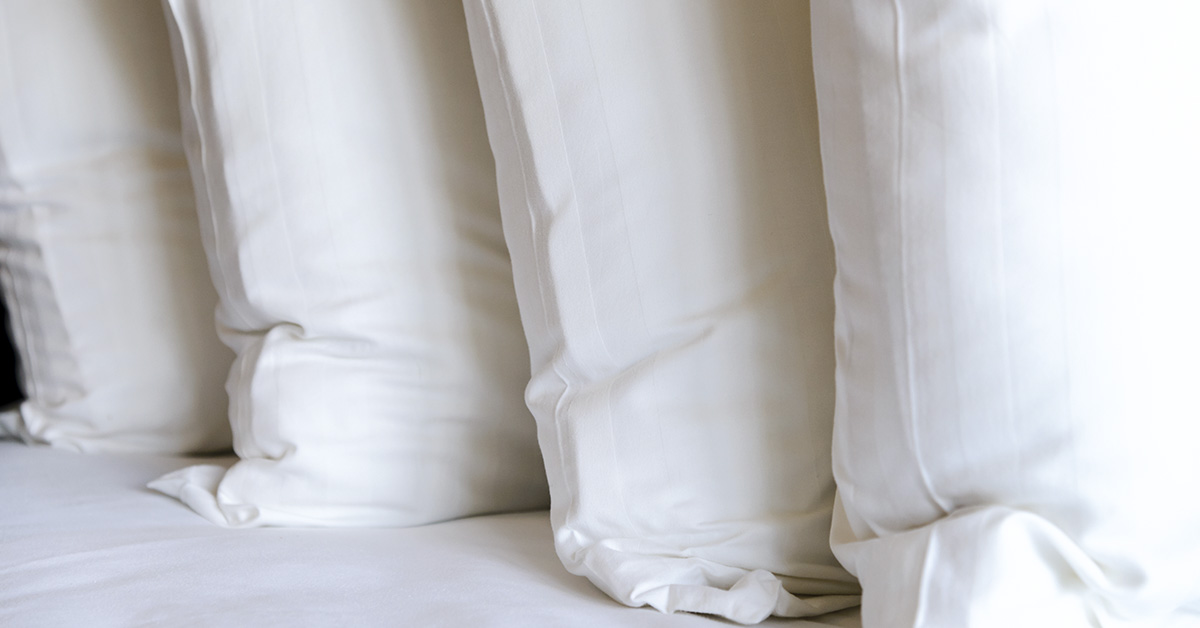We all know how important it is to get a good night’s sleep. But have you ever stopped to think about what you’re sleeping on? Most of us spend a third of our lives in bed, and our pillows are crucial to that experience. (1) many people are unaware of the possible dangers lurking in their pillows. Some pillows have chemicals in them that could be toxic and may not be good for your health. Thankfully, there are alternatives.
There Are Potentially ‘Toxic’ Chemicals In Some Pillows
When we think of things that are not good or “toxic” for our health, we usually think of things we might consume or come in contact with our skin. These can be food items, cleaning products, perfumes, and cosmetics. Most of us don’t think about the fabrics that we come in contact with each day and how what they are made of could affect our well-being. One surprising potential source of dangerous chemicals? Your pillow.
Flame Retardants
There are a variety of hidden dangers that could be in or emanating from your pillows. One of the most concerning is flame retardants. These chemicals are added to pillows to prevent them from catching fire, but they can also be harmful to your health. Flame retardants have been linked to a variety of health problems, including cancer, reproductive issues, and developmental delays in children. Children are more vulnerable to toxic effects because their brains and other organs are still developing. (2)
Volatile Organic Compounds
Another danger is VOCs (volatile organic compounds). These are chemicals that can be released into the air from your new pillows, and they can cause a range of health problems, including headaches, dizziness, and respiratory issues. VOCs can come from a variety of sources, including the foam used in some pillows, the adhesives used to hold them together, and the fabric covering the pillow. (3)
Read: Is it safe to cook with aluminum foil? Potential dangers and alternatives
Dust Mites, Mold, Bacteria, and Fungi
Most of us use the same pillow for months, if not years. Over time they accumulate not only dirt, oils and skin cells but also more problematic things like dust mites, mold, bacteria, and fungi. This is worse if you don’t use a pillow protector, and the accumulation is also worse for synthetic pillows. These can create spores that will cause even healthy people to have breathing issues. Sleeping on a bacteria, fungi, and dust-mite-laden pillow could be problematic if you have sensitive skin or skin issues such as eczema. (4)
Formaldehyde
Some people claim that pillows can contain low levels of formaldehyde. This is because it is sometimes used in textile manufacturing. The likelihood that your pillow contains formaldehyde is quite low; however, if you want to be 100% sure, then you should stick to all-organic-made pillows.
Which Pillows Contain These Dangers?
Unfortunately, many pillows on the market today contain flame retardants and VOCs, among other potential chemicals. Memory foam pillows are a common culprit, as they are made from synthetic materials that can release harmful chemicals. Pillows made from polyester or other synthetic fibers may also contain these dangers. Even down pillows can be problematic, as they may be treated with flame retardants or other chemicals.
What Can People Purchase Instead?
So, what can you do to protect yourself from these hidden dangers? One option is to choose pillows made from natural materials, such as bamboo or buckwheat. These materials are less likely to contain harmful chemicals and can provide a comfortable and supportive sleeping experience. Additionally, some certifications on pillows claim low or no VOCs, such as the Global Organic Textile Standard (GOTS) or the OEKO-TEX Standard 100.
It’s important to do your research before purchasing a pillow to ensure that it is safe and free from harmful chemicals. Look for pillows that are labeled as organic, natural, or free from flame retardants and VOCs. Consider investing in a pillow made from natural materials that are sustainably sourced and produced.
The Bottom Line
The hidden dangers lurking in your pillow can have serious health consequences. You can protect yourself and your loved ones from these risks by choosing a safe and natural pillow. Don’t underestimate the importance of a good night’s sleep, and make sure that you’re sleeping on a pillow that supports your health and well-being.
Keep Reading: Dollar Stores Are Full of Toxic Products
Sources
- “We spend about one-third of our life either sleeping or attempting to do so.” PubMed. Michael J Aminoff,et al. 2011.
- “Flame Retardants.” NIEHS
- “Volatile Organic Compounds’ Impact on Indoor Air Quality.” EPAThe Round Up. James Miller
- “Could my pillow be affecting my health…or worse, is my pillow toxic?” Slumbr

